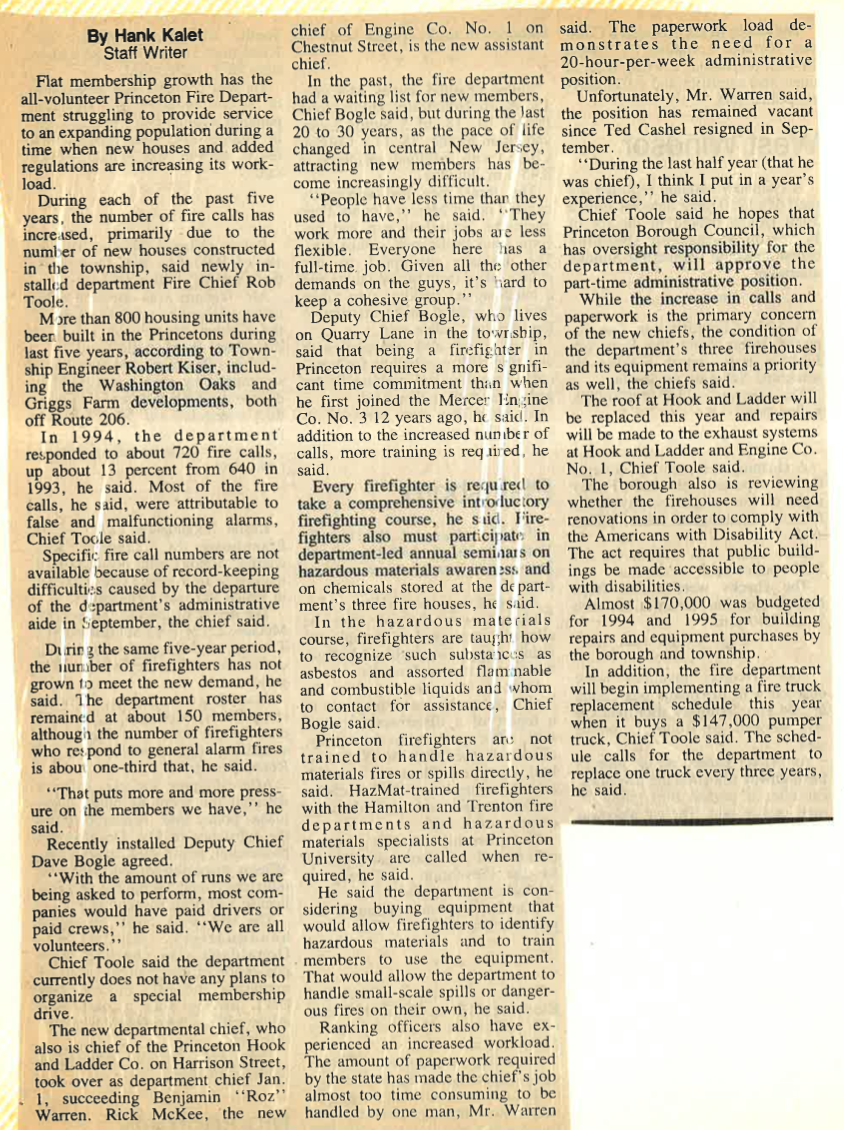
January 24, 1995
The Princeton Packet
Firefighter rosters not keeping pace with development
By Hank Kalet
Staff Writer

Flat membership growth has the all-volunteer Princeton Fire Department struggling to provide service to an expanding population during a time when new houses and added regulations are increasing its workload.
During each of the past five years, the number of fire calls has increased, primarily due to the number of new houses constructed in the township. said newly installed department Fire Chief Rob Took.
More than 800 housing units have beer built in the Princetons during last five years, according to Township Engineer Robert Kiser, including the Washington Oaks and Griggs Farm developments, both off Route 206.
In 1994, the department responded to about 720 fire calls, up about 13 percent from 640 in 1993, he said. Most of the fire calls, he said, were attributable to false and malfunctioning alarms, Chief Tale said.
Specific fire call numbers are not available because of record-keeping difficulties caused by the departure of the department’s administrative aide in September, the chief said.
During the same five-year period, the number of firefighters has not grown to meet the new demand, he said. The department roster has remain( d at about 150 members, although the number of firefighters who respond to general alarm fires is about one-third that, he said.
“That puts more and more pressure on the members we have,” he said. Recently installed Deputy Chief Dave Bogle agreed.
“With the amount of runs we arc being asked to perform, most companies would have paid drivers or paid crews,” he said. “We are all volunteers.”
Chief Toole said the department currently does not have any plans to organize a special membership drive.
The new departmental chief, who also is chief of the Princeton Hook and Ladder Co. on Harrison Street, took over as department chief Jan. I, succeeding Benjamin “Roz” Warren. Rick McKee, the new chief of Engine Co. No. 1 on Chestnut Street, is the new assistant chief.
In the past, the fire department had a waiting list for new members, Chief Bogle said, but during the last 20 to 30 years, as the pace of life changed in central New Jersey, attracting new members has become increasingly difficult.
“People have less time than they used to have,” he said. “They work more and their jobs are less flexible. Everyone here has a full-time job. Given all the other demands on the guys, it’s hard to keep a cohesive group.”
Deputy Chief Bogle, who lives on Quarry Lane in the township, said that being a firefighter in Princeton requires a more significant time commitment than when he first joined the Mercer Engine Co. No. 3 12 years ago, he said. In addition to the increased number of calls, more training is required, he said.
Every firefighter is required to take a comprehensive introductory firefighting course, he said. Firefighters also must participate in department0led annual seminars on hazardous materials awareness and on chemicals stored at the department’s three fire houses, he said.
In the hazardous materials course, firefighters are taught how to recognize such substances as asbestos and assorted flammable and combustible liquids and whom to contact for assistance, Chief Bogle said.
Princeton firefighters are not trained to handle hazardous materials fires or spills directly, he said. HazMat-trained firefighters with the Hamilton and Trenton fire departments and hazardous materials specialists at Princeton University are called when required, he said.
He said the department is considering buying equipment that would allow firefighters to identify hazardous materials and to train members to use the equipment. That would allow the department to handle small-scale spills or dangerous fires on their own, he said.
Ranking officers also have experienced an increased workload. The amount of paperwork required by the state has made the chief’s job almost too time consuming to be handled by one man, Mr. Warren said. The paperwork load demonstrates the need for a 20-hour-per-week administrative position.
Unfortunately, Mr. Warren said, the position has remained vacant since Ted Cashel resigned in September.
“During the last half year (that he was chief), I think I put in a year’s experience,” he said.
Chief Toole said he hopes that Princeton Borough Council, which has oversight responsibility for the department, will approve the part-time administrative position.
While the increase in calls and paperwork is the primary concern of the new chiefs, the condition of the department’s three firehouses and its equipment remains a priority as well, the chiefs said.
The roof at Hook and Ladder will be replaced this year and repairs will be made to the exhaust systems at Hook and Ladder and Engine Co. No. 1, Chief Toole said.
The borough also is reviewing whether the firehouses will need renovations in order to comply with the Americans with Disability Act. The act requires that public buildings be made accessible to people with disabilities.
Almost $170,000 was budgeted for 1994 and 1995 for building repairs and equipment purchases by the borough and township.
In addition, the fire department will begin implementing a fire truck replacement schedule this year when it buys a $147,000 pumper truck, Chief Toole said. The schedule calls for the department to replace one truck every three years, he said.